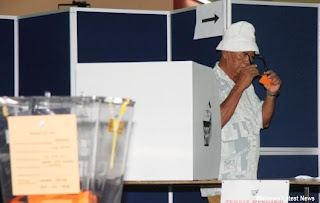KUALA LUMPUR, March 10 ― The Pakatan Rakyat (PR) has sought a
judicial review to compel the Election Commission (EC) to clean voter
rolls in Selangor, apart from verification checks to weed out suspicious
voters, its lawmakers have said.
Klang MP Charles Santiago will know this Thursday if his application
to get the EC to review electoral rolls in his constituency is
successful, but he was also aghast that the commission thought it
“normal” to have 28 per cent unidentified voters out of 500,000 new
registrants in Malaysia’s most industrialised state, owing to people
moving around in the country.
“When I read the news, I was thinking that it was the most
irresponsible statement,” said Santiago of the EC deputy chief Wan Ahmad
Omar who gave that reason last Friday.
The Klang MP had filed for a judicial review at the Shah Alam High
Court last month to compel an investigation by the EC, which he claimed
has been dragging its feet over the issue of suspect voters.
Santiago cited the cases of 6,000 doubtful voters, 3,457 voters whose
names were removed from the roll without permission or information, and
2,195 voters who were transferred without consent.
Other PR lawmakers are watching to see the results of Santiago’s
“test case” before following suit, including Shah Alam MP Khalid Samad.
“Actually the only option left to us is to bring to court,” the PAS
MP said here, although he agreed that their chances might be slim.
Instead, Khalid will bank on public support to neutralise the effects of phantom voters.
DAP’s Teresa Kok agreed with Khalid, saying that she will ask her
supporters to mobilise genuine voters to come out during polling day.
She suggested for voters to help out during the campaigning period,
and to volunteer as polling and counting agents to monitor any possible
wrongdoings.
“We can’t do much, because all of [the unidentified voters] are in
the gazetted electoral roll,” the Kinrara assemblyman conceded, saying
that she is getting the list of unidentified voters checked in her own
state constituency.
“At our level, we have prepared our people, they are given a list of
those names that can’t be located,” PKR’s Zuraida Kamaruddin told The
Malaysian Insider.
“So if there are these people turning up to vote, we will have to do
some initiative on our own to do some verification,” the Ampang MP said,
detailing three stages of verification that she will implement.
In the first two steps, party members will protest to the EC
including complaining through relevant forms, if blacklisted names and
voters with dubious addresses appear in the final gazetted electoral
roll.
Finally, they will dispute any irregularities found during checks on
polling day, when party members will verify whether a voter is a
foreigner or has not stayed long in the country before obtaining their
identity cards.
Any irregularities in the electoral roll will be filed and recorded
for documentation purposes so that court action can be taken after
voting if necessary, Zuraida said.
“But at same time, we are not going to discount that we will stop
them from voting,” she said, although she acknowledged that it would be
an election offence to do so.
Khalid said, however, that although polling agents could cross-check
electoral roll against Selangor’s list, not much could be done as they
would be seen as preventing legitimate voters from voting.
The EC had said that it cannot stop those who are registered from
voting, as it is their legitimate right to do so even if they could not
be traced.
Selangor’s initiatives have received the thumbs-up from election
watchdog Bersih, who urged the state government to continue pressing
this issue, including taking the legal route.
“They have to continue publicising this ... Maybe they can go to
court to compel the EC to act. They should also lodge a police report,”
suggested Bersih co-chair Datuk Ambiga Sreenevasan.
The independent coalition reiterated their support to Selangor,
saying it will provide the state government information, but did not
furnish further details on its own action regarding the issue, which it
described as “affecting everyone”.
Malaysian Electoral Roll Analysis Project (MERAP) director Dr Ong
Kian Ming admitted that political parties could only do so much,
considering that the law stated that the electoral roll cannot be
legally challenged in court.
Selangor could pursue legal means or provide the list of untraceable
voters to alert polling agents of political parties, said Syed Ibrahim
Syed Noh, the president of the watchdog group Malaysians for Free and
Fair Elections (MAFREL).
Zuraida summed up Election 2013 as “a very important election” and
called for her comrades to be careful, since one vote will determine a
win for either side.
The EC has reportedly refused to work together with PR in an effort
to clear up the electoral roll, claiming that Selangor has gone to the
media for political mileage instead of directly meeting the commission.
PR won 36 out of a total of 56 state seats in Selangor in the last
general election where PKR’s Tan Sri Abdul Khalid Ibrahim replaced
Umno’s Dr Mohd Khir Toyo as mentri besar.
Some PR leaders have alleged that the influx of new voters in the
state was part of a BN conspiracy to topple the Khalid administration
through cheating. BN leaders have denied the allegation.
A poll analysis recently found that the highest concentration of
dubious voters was in Selangor, the country’s wealthiest state that
Prime Minister Najib has pledged to take back “at all costs.”
